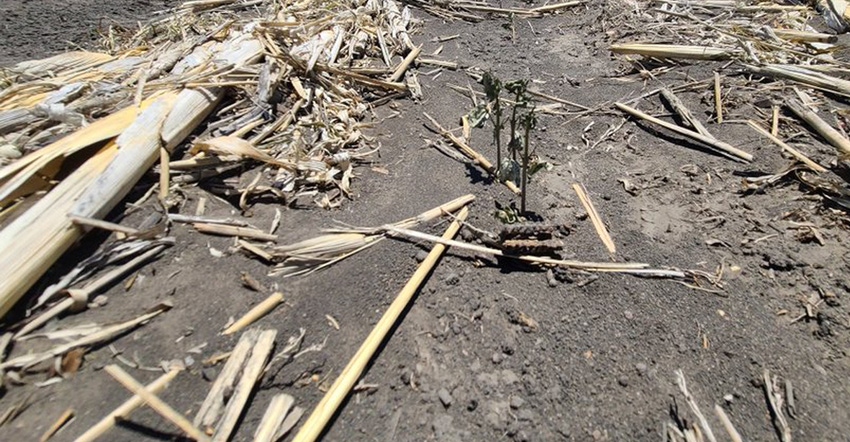
Challenges continue to mount for this year’s Texas High Plains cotton crop, as many growers, including those in the northern Panhandle, saw their young plants burn and wither away earlier this week under a canopy of blowing dust.
Extremely high winds – reportedly more than 40 mph for extended periods of time – caused blowing sand to scorch fields in several counties, and the wind itself was instrumental in harming plants. Although high winds are common with severe storms, it is not near as common that they persist for hours at this point in the season. Growers and ginners report a significant amount of acreage was affected, and it likely will be difficult to replant back to cotton in those areas.
“It’s the worst wind event anyone can remember in June,” Leighton Stovall, manager of Moore County Gin near Dumas, said Friday, noting that all the dryland acreage in his area is gone and possibly half of the irrigated acreage. “We had 45-mile per hour sustained winds out of the northwest gusting to 70 that lasted from 10 in the morning until 6 in the evening.”
Other parts of the PCG service area remain extremely dry, and time will tell how much dry-planted cotton acreage actually will emerge.
“There’s no doubt the situation is pretty dire in a lot of areas,” PCG CEO Steve Verett said. “Unless we can get a good rain here pretty quickly, the acreage picture is going to be shaken up significantly. In another two weeks, we’ll have a better idea.”
Add to that the continued uncertainty around last week’s news of the United States Ninth Circuit Court of Appeals’ order to vacate the registration of three dicamba-based herbicides, including XtendiMax, FeXapan, and Engenia – not to mention a depressed market – and it becomes apparent that growers are facing many challenges that are out of their control.
The Environmental Protection Agency issued a cancellation order on Monday that addresses the sale, distribution and use of the affected dicamba products. The EPA says that “Growers and commercial applicators may use existing stocks that were in their possession on June 3, 2020, the effective date of the Court decision. Such use must be consistent with the product’s previously-approved label, and may not continue after July 31, 2020,” according to a news release from the agency.
The order can be seen in its entirety here: https://www.epa.gov/sites/production/files/2020-06/documents/final_cancellation_order_for_three_dicamba_products.pdf
However, plaintiffs for the original case already have filed an emergency motion challenging the cancellation order, even going so far as to asking the judges to hold EPA Administrator Andrew Wheeler and the agency in contempt of court. Also, the same plaintiffs have a pending lawsuit against Enlist Duo, Corteva Agriscience’s 2,4-D-choline and glyphosate blend herbicide.
PCG has submitted a request to TDA for immediate consideration of a Section 18 Emergency Use label for XtendiMax, FeXapan, and Engenia in Texas.
“The recent vacating of the EPA-approved labels for these products as a result of court action is a significant economic threat to producers and has put at risk millions of acres of dicamba-tolerant cotton planted in Texas,” PCG’s Verett said in the letter. “The unexpected removal of these products places our membership and other cotton producers in Texas in dire circumstances.”
Source: is Plains Cotton Growers, which is solely responsible for the information provided and is wholly owned by the source. Informa Business Media and all its subsidiaries are not responsible for any of the content contained in this information asset.
About the Author(s)
You May Also Like




